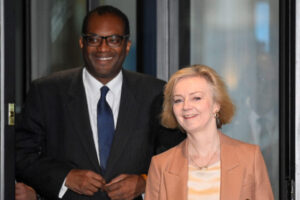The political fall-out from this poor macroeconomic policy making has been substantial with pressure on the new Prime Minister to resign

British Prime Minister Liz Truss and now-former Chancellor of the Exchequer Kwasi Kwarteng walk outside a hotel, as Britain’s Conservative Party’s annual conference continues, in Birmingham, Britain, October 4, 2022 Reuters
Trying to ignore and outsmart macroeconomic fundamentals can be costly, as the new British government has just learnt.
This British experience also has important policy lessons for sound macroeconomic management in Bangladesh as it tries to fight climbing inflationary and balance of payments pressures.
A new British Conservative government led by Liz Truss came to power on September 6, 2022, just two days before Queen Elizabeth passed away.
Prime Minister Liz Truss along with her new Chancellor of the Exchequer (Finance Minister) Kwasi Kwarteng announced an ambitious growth-oriented macroeconomic program that proposed to cut personal and business income taxes, lower stamp duties on properties, and offer tax incentives to new investments.
These measures are on top of an earlier decision to cap household annual energy bills at £2,500.
The tax cut program would cost the Treasury £45 billion while the energy cap would cost £60 billion in 6 months.
This massive cost of the tax cut and cap on household energy spending would be financed through fiscal deficit.
The policy was announced on September 23.
The next Monday as markets opened there were severe adverse reactions.
The Pound Sterling that was already in a lot of stress went into a free fall, interest rates on long-term government bonds surged in anticipation of greater Treasury borrowing, and stock prices plunged.
Overall, the market perception of a financial crisis accentuated and confidence in the British macroeconomic policy management took a nosedive.
What went wrong?
The UK economy has already been under a lot of stress from the adverse effects of Brexit (exit from the EU), Covid-19 and ongoing global inflation.
The UK inflation rate had reached 9% before the mini budget announcement and the currency had depreciated to a low value of 1.12$/£.
The market was expecting inflation control and currency support policies.
Since UK’s reserve levels are low, currency-based interventions to prop up the Pound Sterling is not a feasible option.
The only options are to tighten monetary and fiscal policies with a view to lowering demand.
While the Bank of England is independent of the government and did intervene to raise interest rates, the Treasury provided an opposite signal by seeking to cut taxes and stimulate the economy.
The market perceived that fiscal policy was under-cutting monetary policy and there was a loss of confidence in macroeconomic prospects that triggered the depreciation of the British currency, the fall in government bond prices, and the plunge in stock markets.
The new government should have consulted the Bank of England, independent researchers, and the private sector to discuss its plans.
It should also have appreciated that the UK economy was facing huge inflationary pressure and the top priority was to reduce inflation with a coordinated set of monetary and fiscal policies.
Instead, it ignored the market fundamentals and put priority to delivering on its electoral promises to cut taxes and push economic growth.
There is nothing fundamentally wrong with the government’s thinking about cutting taxes to stimulate growth, but timing was all wrong.
When the economy is facing large inflationary pressure, the top priority is to lower inflation and stabilize the currency through increased interest rates.
The Bank of England was focused on that.
The Treasury should have supported this policy stance and done other complementary reforms to cut wasteful spending, support programs that help the low-income group, and deregulate the economy to cut bureaucracy and inefficiencies.
The growth-oriented fiscal policy could have waited another 6-9 months to allow time for restoring macroeconomic stability.
Fallouts
The political fall-out from this poor macroeconomic policy making has been substantial with pressure on the new Prime Minister to resign.
The government took a back-turn and reversed many of the tax cuts proposed in its mini budget.
To calm the markets, Liz Truss also fired her Finance Minister.
There has been some positive response to these steps as the downward spiral of the UK currency has reversed, government bond prices have stabilized and turmoil in the stock markets has subsided.
Yet, the markets remain nervous and considerable uncertainties prevail.
Although the Bangladesh economy is fundamentally different from the British economy, there are important lessons from this botched British experience with macroeconomic management.
The Bangladesh economy is also facing some tough macroeconomic stability challenges.
The current account deficit has soared, some 25% of foreign reserves have been depleted since August 2021, short-term debt has increased, and inflation has accelerated.
The government has responded by partially depreciating the currency, putting import controls, raising tariffs, and increasing budget subsidies on fertilizer and energy products.
Import controls have lowered the current account deficit, but there is continued pressure on the balance of payments, a shortage of foreign exchange, and inflationary pressure is on the rise.
The large loss of reserves and prevalence of multiple exchange rates have increased the short-term vulnerability of the foreign exchange market.
Lessons for Bangladesh
As the case of the UK mini budget, Bangladesh’s policy making is heavily focused on propping up the economy to accelerate GDP growth.
This is reflected in monetary and fiscal policy management.
The government is trying to promote economic growth by putting a cap on the lending rate at 9%.
The tax effort has either fallen or remained stagnant. Fiscal deficit has increased.
These growth-oriented policies have come under serious conflict with the need for stabilizing the macroeconomy through policies to reduce aggregate demand.
Low and now negative real lending rates have increased demand for private credit that has grown from 8-9% a year ago to 14% now, adding to inflationary and balance of payments pressures.
Expansionary fiscal policy has similarly boosted demand instead of reducing it.
Learning from the botched British experience, policy must refocus on reducing demand through a judicious mix of exchange rate, interest rate, tax, and spending policies.
The massive loss of reserves reflects an unsustainable effort to prevent a further depreciation of the Bangladesh Taka, which remains over-valued despite recent depreciation owing to the past misguided exchange rate management that saw a real appreciation of the Bangladesh taka by 71% between FY2011 and FY 2020.
The government started well by announcing its intention to let the exchange rate be market determined.
But it soon changed course and instead adopted a multiple exchange rate (one for exports, one for remittances and one for imports) with fixed rates for each of the transactions.
The government has now reached a situation where further loss of reserves would imperil its foreign transactions management including short-term debt.
The best course of action would be to eliminate the multiple exchange rates and let there be a uniform market-determined exchange rate.
The exchange rate flexibility should be combined with policies to reduce demand pressure in the foreign exchange and the domestic markets.
The most fundamental reform is the need to eliminate the cap on the lending rate.
It is ridiculous to maintain a negative lending rate at a time when inflation is on the rise and the exchange rate is under pressure.
Credit growth has to be lowered and not increased to lower inflation and reduce the demand for imports.
Monetary policy should be used to monitor and adjust the movement of the interest rate as necessary.
Fiscal policy must also be used at the present time to reduce demand.
Tax effort should be strengthened through a well-thought out and productive tax reform.
Many of the elements of the required tax reform are well known.
Strong political will at the top is necessary to implement the required tax reforms.
Expenditure management should focus on lowering subsidies and increasing social sector spending on health, education, water supply and social protection.
The priority given to infrastructure spending should continue but efforts should be redoubled to increase the efficiency of this spending by timely completion of projects. Fiscal deficit should be lowered to 5% of GDP or below.
The growth focus of monetary and fiscal policy can be restored once the macroeconomy is stabilized.
The author is vice-chairman of the Policy Research Institute of Bangladesh. He can be reached at Sadiqahmed1952@gmail.com







